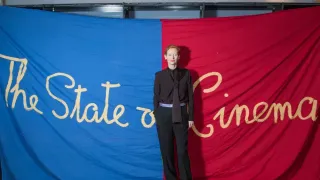
7 hours ago
Fans Light Up Social Media After Tom Holland Debuts Cury Blond Hair in LEGO Short Film
READ TIME: 3 MIN.
Tom Holland, the British actor best known for his portrayal of Spider-Man, stunned fans worldwide when he debuted a dramatic blond curly hairstyle in LEGO’s latest short film "Never Stop Playing." Released on LEGO’s official YouTube channel and promoted across entertainment outlets, the two-minute film sees Holland morphing through a kaleidoscope of characters, most notably a blond footballer with a middle part and signature curls. This image quickly spread across social media, igniting passionate reactions and sparking conversations about creativity, identity, and representation in mainstream media .
The short film, released in early September 2025, blends live-action performances with digital animation to champion the value of play and self-discovery. Holland opens the film in his familiar brunette look before rapidly transforming into an array of personas, including a sci-fi warrior, a bald corporate executive, a goateed artist, and of course, a blond soccer star. In one memorable scene, the blond Holland confidently addresses a crowd of reporters, declaring his unwavering commitment to play: “No matter how busy life gets, I’ve never stopped playing… and I don’t plan to anytime soon!” .
LEGO’s official statement accompanying the film emphasized the campaign’s intention to celebrate creativity and encourage viewers of all ages to embrace their playful side. For many in the LGBTQ+ community, this message resonates as a call to authenticity and visibility—a core value in ongoing efforts for inclusion and representation in media .
Social media platforms lit up with reactions as soon as the short film aired. On Instagram and X (formerly Twitter), fans posted screenshots and commentary on Holland’s transformation, with some users praising the look for its boldness and charm. One fan wrote, “Ngl, he looks like the handsome quarterback in teen fiction and high school movies.” Another commented, “He looks great!” .
However, not all feedback was positive. Some viewers expressed skepticism, with one posting, “Not looking so good on him am I right.” The debate reflects the broader cultural significance of celebrity appearance changes and the expectations placed on public figures. For queer fans, Holland’s playfulness and willingness to experiment with his image are seen as affirming—offering another example of how mainstream media can embrace fluidity and diversity in self-presentation .
Numerous users in queer online forums celebrated Holland’s transformation as “queer-coded,” noting that his willingness to shift between different identities and looks in the film aligns with the community’s embrace of personal reinvention and self-expression. Media commentators have pointed out that Holland’s willingness to embrace a wide spectrum of looks in mainstream advertising is significant. Furthermore, the playful tone of “Never Stop Playing” invites viewers to reflect on the importance of joy and playfulness in adult life—a theme that resonates for many queer people who may have experienced pressure to conform or suppress aspects of their identity.
The hashtag #BlondeTom quickly trended on X, with thousands of posts exploring the potential implications of Holland’s new look. Some users created memes and fan art reimagining Holland as various iconic blond characters from cinema and literature, while others debated whether the transformation might signal a future role or personal style shift. Notably, several LGBTQ+ influencers and content creators participated in the conversation, sharing their own stories of changing hairstyles and experimenting with gender presentation. TikTok creator @QueerHairCare posted a reaction video, stating, “If Tom Holland can go blond for LEGO, maybe it’s time I tried something new, too!”
Holland’s partnership with LEGO is the latest in a series of high-profile collaborations for the actor, who recently became a brand ambassador for Prada. The ad also featured brief appearances from Holland’s brothers, Sam and Harry, further emphasizing the theme of family and togetherness. While Holland has not commented directly on the queer response to his transformation, he has previously voiced support for inclusive storytelling and representation in film .
LEGO itself has continued to engage with LGBTQ+ communities, supporting Pride initiatives and working with advocacy groups to ensure their products reflect a diverse world. In a statement to E! News, LEGO reaffirmed its commitment to “providing spaces for every child—and adult—to see themselves in play” .






